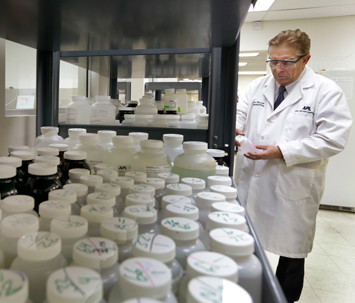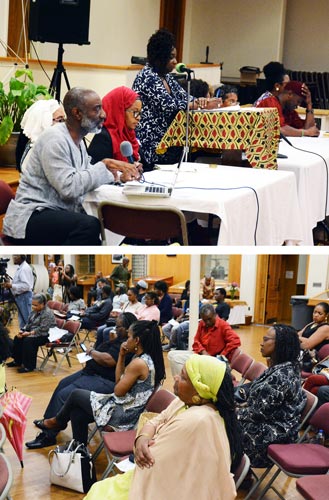American Genocide - Flint Water Crisis
By Barrington M. Salmon -Contributing Writer- | Last updated: Jun 28, 2016 - 9:57:52 AMWhat's your opinion on this article?

Water from the Flint River moving through the Hamilton Dam near downtown Flint, Mich. Photo: flickr/georgethomas
|

Flint resident Grant Porter, 5, watches as his mother Ardis Porter, 26, has her blood drawn for lead testing at the Flint Masonic Temple on Jan. 23, in Flint, Mich. Porter said she was having her and her son tested because she’s pregnant and he’s young. Photos: AP/.Wide World photos
|
Poisoned water mirrored in Black and Brown communities nationwide
WASHINGTON - The poisoning of Flint, Michigan’s drinking water may have fallen off newspapers’ front pages and television screens, but residents are asking those concerned about the fallout and the effects on the city’s almost 100,000 residents to not forget them.
Several Flint residents were among a slate of panelists who discussed the on-going crisis at the historic Metropolitan AME Church in downtown Washington, D.C. at a national town hall meeting. In addition to presenting the roots of the tragedy, panelists spoke about the strategies and plans either being considered or already underway and tied the lead poisoning to cities and communities across the country.
“Some people call it an emergency or a crisis, some call it a disaster, others say put yellow tape around the city,” said community activist Yvonne Lewis, who has lived in Flint for 40 years. “I can’t share with you everything everybody feels. The disaster is framed as a poor, Black, African American issue but every one of every race has been affected,” she said.

In this, March 25, photo, Robert Barrett, president & CEO of Aqua Pro-Tech Laboratories, in Fairfield, N. J., examines some drinking water test samples at the facility. Responding to the crisis in Flint, Michigan, school officials across the country are testing for lead in the water flowing from classroom sinks and cafeteria faucets to reassure anxious parents or take action if they are surprised by the results. In March, the school district in Newark, New Jersey, shut off sinks and fountains in 30 buildings in response to high lead samples while offering to test as many as 17,000 children for lead contamination.
|
“There is intent and intention. It may not have been the intent to poison the community but the intention was to remove the power of choice. Our community is afraid of being forgotten, afraid of being left behind. We have enough to help ourselves … we’re standing and will continue to stand.”
For more than a year, Michigan Governor Rick Snyder and state officials delayed, ignored and stonewalled as complaints from frustrated and concerned Flint, Michigan residents mounted.
“Before it got on TV, we had three lead people out in front. We saw water running from the hydrants before April 14,” said E. Hill Deloney, a Flint resident and executive director of PARTNERS. “Some people came and asked what’s wrong with the water. The oppressor put a plan together to save the oppressed. They went directly to the Red Cross, found people who looked like them. ”
Ms. Deloney said Michigan state officials formed the group called Resiliency Group which had no water officials or community or grassroots organizations. She said she publicly expressed her displeasure at the lack of representation of Blacks and others and chastised the organizers.

Dr. Mwata Kevin Washington, providing the audience some facts about the effects of drinking water with lead in it. (Bottom Photo) The audience listens to information being presented by panelists at the WPFW live broadcast on June 22 in Washington, D.C. Photos: Roy Lewis
|
“We have been here fighting the government face-to-face. We’ve been flipping the script completely.” Bishop Bernadel Jefferson agreed.
“We were left out of meetings and solutions. You can assume to know what we need but you don’t,” said Jefferson, pastor of Faith Deliverance Center in Flint and a plaintiff in a lawsuit that challenges the state’s emergency manager law.
“We went to the mayor, we went to the council, we went to the emergency manager. We went to the governor and he refused to speak to us. When he says he didn’t know, he’s lying. He wasn’t sorry, he’s just sorry he got caught. It took Dr. Mona Hanna-Attisha to step forward.”
“This is genocide. It started in 2011 with the emergency management law. It took our vote and voice away. We didn’t have a say so with the emergency management. They sold off all our public assets. The root problem is the emergency manager.”
Bishop Jefferson and Ms. Deloney said residents and activists continue to agitate in Detroit, Lansing and elsewhere in the state on the city’s behalf and continue to push for accountability from Snyder and other state, county and city officials who have refused to take responsibility for the man-made public health crisis.
Accountability and responsibility
When Gov. Snyder authorized Emergency Manager Darnell Early to switch Flint’s drinking water from the clean, fresh water of Lake Huron to the foul, dirty and corrosive Flint River in 2014, residents began complaining about the foul taste and color of their drinking water but the governor, his former spokesman, state and city officials, dismissive of the chorus of complaints, continued to insist that the water was safe to drink.
Since then, the move—made ostensibly to save money—has left Flint residents to deal with the long-term consequences and fallout from a lead poisoning tragedy that could affect them and their children into the foreseeable future. Problems associated with exposure to lead are irreversible. Lead is a potent neurotoxin which can cause memory loss, irreversible brain damage, impaired development, cognitive dysfunction, speech impediments and other serious chronic conditions, particularly in children.

Rick Snyder, current Governor of Michigan
|
According to the Centers for Disease Control and Prevention, even marginal lead exposure can cause behavioral and cognitive problems, including an increased tendency to exhibit violent behavior. Moreover, children affected by lead poisoning are seven times more likely to end up as a high school dropout and are six times more likely to become involved in the juvenile justice system than those not exposed to lead. Moreover, the impact of lead exposure is irreversible.
Dr. Hanna-Attisha, a Flint pediatrician, described as the proverbial canary in the coal mine—took the unusual step of sharing the results of her exhaustive study at a press conference. She found that the proportion of children under five in Flint with elevated lead levels in their blood nearly doubled following the city’s switch to Flint River water.
According to the Detroit Free Press, Dr. Hanna-Attisha found that children in Flint who were tested exhibited elevated blood-lead levels which jumped from 2.1 percent in the 20 months prior to Sept. 15, 2013, to four percent between Jan. 1 and Sept. 15, 2015. In certain zip codes, she said, the change was even more dramatic and troubling, spiking from 2.5 percent to 6.3 percent in children who were tested. The changes correspond closely to the timing Emergency Manager Early authorized the switch.
Dr. Jewel Crawford told the audience at the National Town Hall that she’s very concerned not just about the effects on children but on adults, too.
“We’re not taking a holistic perspective on how it’s affecting adults. None of us know exactly what the effects are,” she said. “I’m most concerned about hypertension. Lead causes blood vessels to restrict. Thirty-to-40 percent of Black people are hypertensive which is the silent killer,” Dr. Crawford explained.
“I’m very concerned with these cities with high lead content. This leads to strokes, heart and kidney failure, gout and such. Children need parents we have to be concerned about that. I encourage everybody in this room to know your own blood pressure. There are lots of natural substances that can bring it down. It can be catastrophic for an individual. You’ve got to live until you get the pipes fixed.”
Gov. Snyder has refused to step down but Michigan Attorney General Bill Schuette is pursuing cases against others responsible for the crisis. On June 22, he announced that he, through his office, is suing two engineering services firms for their roles in the city of Flint’s lead poisoning crisis.

|
In January, Schuette named a special prosecutor to lead the investigation into whether criminal charges should be filed. To date, two state employees have been charged by Schuette’s office, and the attorney general reaffirmed on June 22 that other employees would be charged as his investigation continues.
And in May, Flint Utilities Administrator Michael Glasgow agreed to cooperate in investigations as part of a plea deal. He pled no contest to willful neglect of duty and saw the dismissal of tampering with evidence, a felony.
The roots of injustice run deep
Titled, “We Charge Genocide.” Flint, MI Water Crisis and the Poisoning of Black Communities: A National Town Hall Meeting, a good part of the June 22 panel discussion centered on the links between genocide and Flint.
“How do genocides begin? Rounding people up, dumping drugs in the community or infecting blankets with smallpox. This was done with the stroke of a pen, under the auspice of an emergency,” said Nayyirah Muhammad, a Flint resident and community activist.
“They took our power to vote, stripped it and set it aside. This is asset stripping, privation of resources and austerity. Giving them to family, friends and donors and nothing gets to the residents. This is what the law is: renegotiating contracts and taking control or dissolving municipalities not because of wartime or martial law but because you’re in debt.”
She spoke of the fact that although Flint is surrounded by 30 percent of all the freshwater in the world, Flint residents pay the highest water rates in the U.S.
Dr. Pat Newton, a trauma expert and noted psychiatrist, said the genocide taking place with Flint residents and those in cities and towns across the country has a long historical precedent.
“If you’re attempting to control a population, you minimize their intelligence quotient and thus their competitiveness,” she said. “Flint brought to immediate mind elements of genocide. It’s eminent domain, taking people’s land, traumatizing people so much that they cannot help themselves. A decade ago, the United Nations said water and the securing of water would be the equalizer of countries. We need reparative justice even if we so take the measurements,” said Dr. Newton.
“The question is how do you create a toxic environment so people can’t compete for the resources in this country. It’s all tied together. It’s a circular movement. People need to see and understand the geopolitics of health, water and eminent domain. Poor White folks aren’t immune either.”
D.C.-area activists Salim Adofo and Lateisha Adams have been working on the ground to help Flint residents in a variety of ways, be it collecting and donating bottled water, joining forces with community organizations and activists in Flint and surrounding municipalities, and offering other types of support.
“It’s important to have foot soldiers on the ground,” Adofo said. “We’ve been in full support of what’s needed to correct what has happened in Flint. We’re putting our time, energy and money into this. We have to connect with regular people wherever this is occurring. It’s happening in South Africa, Ethiopia and other countries. It’s an international struggle, brothers and sisters.”

|
To many of the panelists’ point, environmental experts and activists said Flint represents the tip of the iceberg of an catastrophe that is rippling through cities, large and small in the U.S.
Danyelle Solomon and Tracey Ross of the Center for American Progress (CAP), argue that there is a clear and compelling link between low-income, Black communities and environmental racism. The pair co-authored an article on the group’s website in February addressing the Flint crisis.
Given America’s long history of environmental racism, the pair argued, it’s hard to ignore the fact that 56 percent of Flint’s population is Black and most of the city’s residents live paycheck-to-paycheck. The 2015 Census indicates that more than 40 percent of residents are living below the federal poverty level, the pair wrote in a report.
Like a number of cities in the Rust Belt, Flint, the site of General Motors’ emergence, has seen its industrial base shrink and governments disinvest in all forms of infrastructure. Further, state and city leaders have slashed support for the city’s schools, public transportation, and employment, noted the article.
Lead contaminated water has been detected in a number of other U.S. cities over the past several years including Jackson, Miss., Greenville and Durham, N.C., Ithaca, N.Y., Newark and others. According to reports hundreds of schools in the country have traces of lead in their water, exposing thousands of children to danger. U.S.A. Today reported in March of this year that almost 2,000 water systems across 50 states found excessive lead levels in cities as well as rural subdivisions over the past four years.
“The water systems, which reported lead levels exceeding Environmental Protection Agency standards, collectively supply water to six million people,” reported usatoday.com after conducting their own investigation. About 350 of those systems provide drinking water to schools or day cares and at least 180 of the water systems failed to notify consumers about the high lead levels as federal rules require, the site noted.
Water quality on Native American lands is even worse. According to The Free Thought Project, in the western U.S., water contamination has been a way of life for many tribes. In Navajo country, located in northern Arizona access to quality water is scarce.
Since the 1950s, their water has been poisoned by uranium mining to fuel the nuclear industry and the making of atomic bombs for the U.S. military. Coal mining and coal-fired power plants have added to the mix reports thefreethoughtproject.com.
“How is it possible that, in 2016, low-income, Black Americans are denied access to clean, safe water?” asked Ross, Associate Director of the Center for American Progress’ Poverty to Prosperity Program, and Solomon, the organization’s Director of Progress 2050. “Unfortunately, the roots of this injustice run deep. Environmental racism is entwined with the country’s industrial past. At the beginning of the 20th century, zoning ordinances emerged as a way to separate land uses in order to protect people from health hazards,” the article continued.
“Over time, however, city planning and zoning ordinances focused less on public health and more on creating idyllic communities, protecting property rights, and excluding ‘undesirables.’ In other words: The least desirable communities were reserved for discarding waste and marginalized people alike.”
Solomon and Ross explained there are costs that all pay for environmental racism and its ill-effects.
“Many Americans believe that racism can be boiled down to a sin marked by slurs and men burning crosses under the cover of night,” they said. “Flint serves as a stark reminder that racism is in the air we breathe, flowing freely into our homes and down the stretch of blocks riddled with liquor stores but begging for a supermarket. There is a societal cost to this reality.”
In the face of such daunting challenges, the pair advocates the need to stand up for environmental justice in Flint and in the nation.
The road ahead for Flint is a very long one and after the immediate crisis has been addressed, it will be years before the nation can fully realize how the state affected the lives of the children poisoned and the families affected need and deserve a lifetime of support, they noted.
“And while the country’s outrage is correct, the injustice in Flint must be viewed as one example of a widespread problem. In order to address the root causes of environmental racism, the nation must demand government accountability and effective industry regulations, support clean energy, and commit to furthering fair housing.”
They said all levels of government must focus on investing in and modernizing infrastructure that will protect the building blocks of society— specifically in areas where there has been historic underinvestment. They estimate that a $1 billion investment in infrastructure creates about 18,000 jobs, while the same size tax cut would generate 14,000 jobs and no new public assets.
“The crisis in Flint has refocused the public spotlight on environmental justice. Voters and policymakers across the country should seize this moment to address the environmental racism that persists in too many communities. If the nation does not stand up against the injustice of environmental racism, communities of color will continue to be targeted.”
“As the country becomes more ethnically and racially diverse, communities of color must have equity in the level and quality of government-provided services. Americans must lend their voices to support not just Flint residents, but also the residents of countless other communities where racism still takes a physical toll.”
INSIDE STORIES AND REVIEWS
-
-
About Harriett ... and the Negro Hollywood Road Show
By Rabiah Muhammad, Guest Columnist » Full Story -
Skepticism greets Jay-Z, NFL talk of inspiring change
By Bryan 18X Crawford and Richard B. Muhammad The Final Call Newspaper @TheFinalCall » Full Story -
The painful problem of Black girls and suicide
By Charlene Muhammad -National Correspondent- » Full Story -
Exploitation of Innocence - Report: Perceptions, policies hurting Black girls
By Charlene Muhammad -National Correspondent- » Full Story -
Big Ballin: Big ideas fuel a father’s Big Baller Brand and brash business sense
By Bryan Crawford -Contributing Writer- » Full Story






 Click Here Stay Connected!
Click Here Stay Connected!








